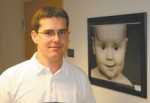DePauw project monitors infant understanding of TV

DePauw project monitors infant understanding of TV
By ADAM COATES, Assistant Editor
Scientists at DePauw University are looking to break new ground through a research study examining the effects of television viewing on young children.
Professor Matt Hertenstein, who has a doctorate in experimental psychology, is spearheading the effort at DePauw's Infant Discovery Lab and says studies have shown the average baby spends more than 500 hours in front of the TV during the first year of his or her life.
These and other statistics have prompted Hertenstein to start the study, in hopes of learning more about how babies relate to what they see on TV and how it affects their mental development as they grow into toddlers.
He said science has done relatively little to study the issue until now. He hopes his study will help.
"The bottom line is we have very little evidence showing us what infants understand and how they process that information," Hertenstein said.
Over the course of the next two years, Hertenstein and his assistants will continue with a variety of experiments involving children and television. Since beginning the study about two years ago, Hertenstein has tested about 60 babies, but he wants to increase that number significantly in the next two years.
Hertenstein recently received a $139,000-grant from the National Institutes of Health for the infant study program. The grant runs through August of 2009, so Hertenstein hopes to conclude the study by then. At that point, he hopes to begin drawing conclusions and issue his report from the study.
"It's a challenging endeavor," he said.
Babies who are enrolled in the study program will take part in a number of experiments involving the TV and external elements such as toys and games.
In one of the experiments, babies watch a TV program in which a person is pictured interacting with a toy or other object. The person is shown reacting in different ways to the toy, such as angry or happy.
After the program concludes, the baby is presented with the same object that appeared on the TV program and their reactions are recorded.
Hertenstein said the purpose of the experiment is to see if the baby will see the object on TV as the same one that is being placed on the table in front of them and if they display the same reaction as the person in the TV program.
Hertenstein said the most important question -- and one he hopes the study will answer -- is what do babies understand when they watch TV. Do they understand what they are watching? Do they remember it later? How does this affect their overall development?
Hertenstein pointed to the increasing number of TV programs that are designed for very young children, such as the Baby Einstein videos and a new Baby Network that recently debuted on cable and satellite TV.
Hertenstein said is not ready to make a determination if such programs actually help children or have little effect.
"It's kind of a mysterious thing because they can't talk to us or tell us anything," he saidof the babies.
What he does know is that human development is affected by two main factors -- genes and their environment.
"There's a lot of room to make up in this field," he said.
He believes there are several societal groups that can benefit from his research, including pediatricians, who recommend no TV viewing for children under 2 years old, parents, other scientists and the companies that make programs for children.
He hopes the study will help parents understand how their children are affected by what they see on TV.
"Infants' behaviors are being regulated by what they see on TV, but the degree to which this happens is open," Hertenstein said, adding that he hopes to better determine the age at which babies actually begin understanding what they see on TV.
The companies that make children's program can benefit, Hertenstein said.
"It will help educate media developers on how they will design programs or whether they even should," Hertenstein said.
In the meantime, Hertenstein said he needs local parents to enroll their children in the study, in order for it to continue. Their target group is children nine to 18 months of age.
To sign up for the program or for more information, call the lab at 658-4609 or 765-657-2222.
